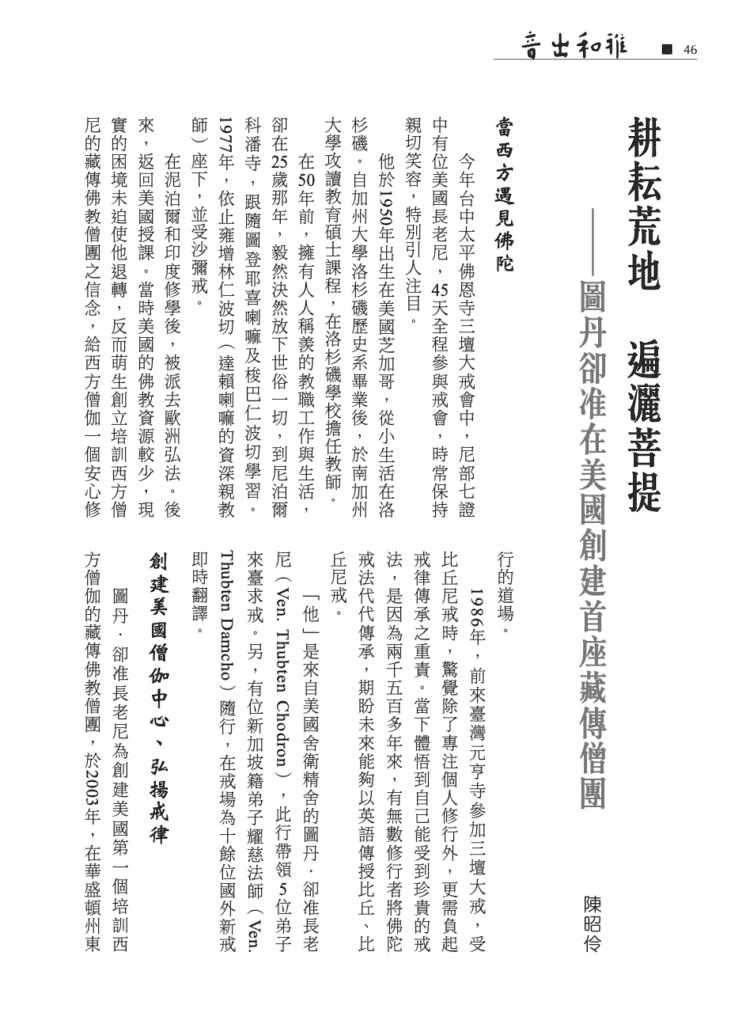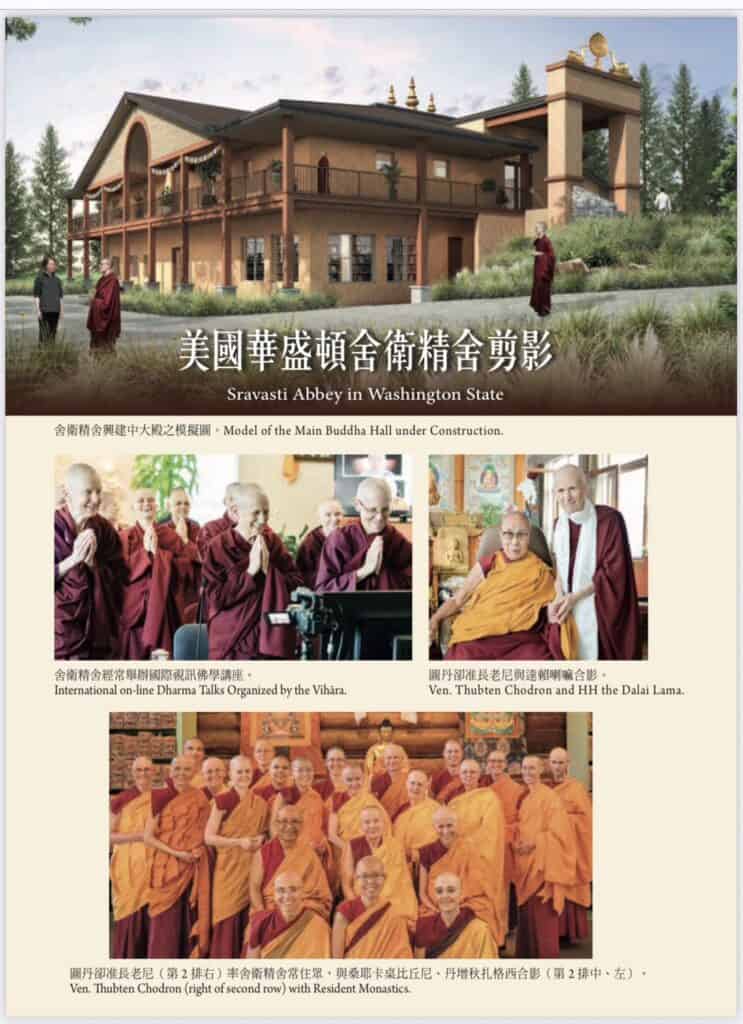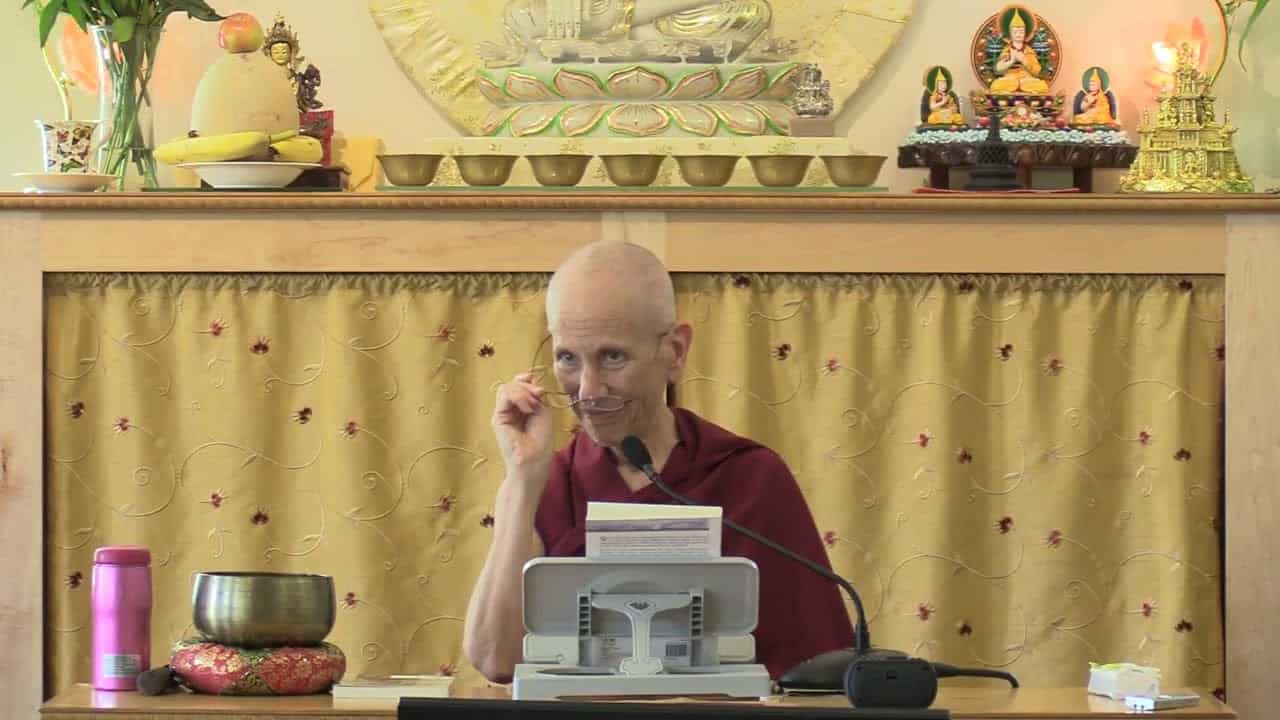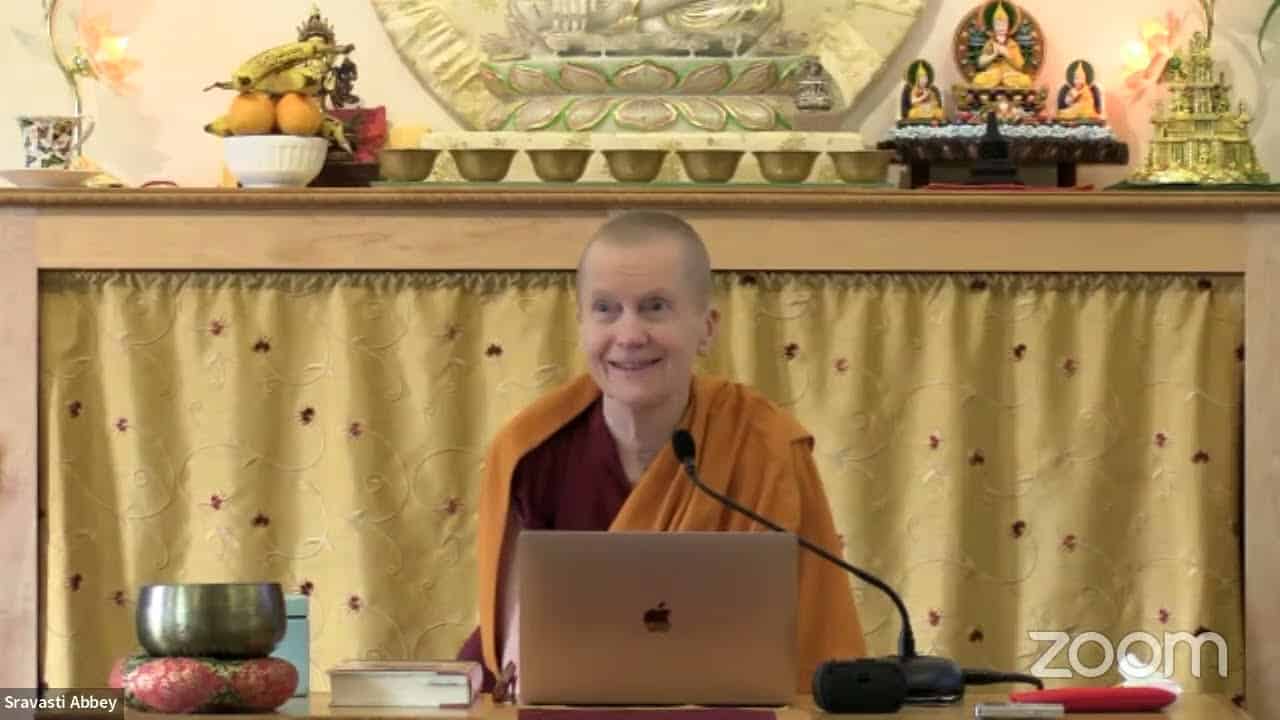Cultivating the wasteland
Sprinkling bodhi everywhere
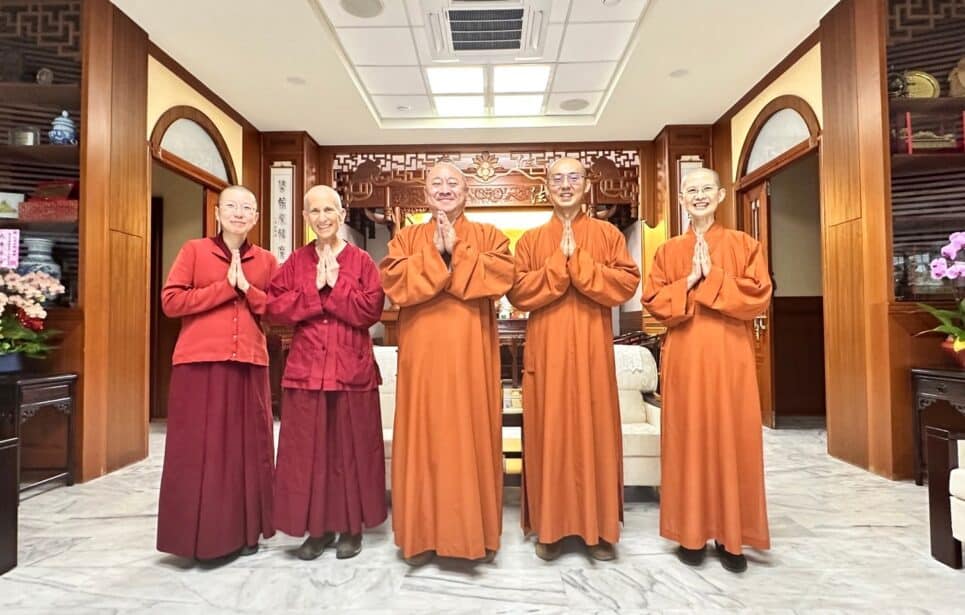
Venerable Thubten Chodron visited Shandao Monastery in Taipei in April 2024 and engaged in an exchange with the Chinese monastics there. The following interview was conducted by Haichaoyin (Sound of the Sea Tide) magazine published by the monastery and went to print in Chinese in June 2024.
When the West meets the Buddha
At this year’s Triple Platform Ordination at Taiping Foen Temple in Taichung, there was an American senior nun among the seven witnesses of the nuns’ department who participated in the entire 45-day program, always smiling kindly, which was especially remarkable.
She was born in Chicago in 1950 and grew up near Los Angeles. After graduating from the University of California, Los Angeles, with a degree in history, she entered a master’s program in education at the University of Southern California while she worked as a teacher in Los Angeles schools.
At the age of 25, after a life of teaching and living in the envy of all, she decided to leave the worldly life behind and go to Kopan Monastery in Nepal to study with Lama Thubten Yeshe and Zopa Rinpoche and in 1977 she took the sramaneri precepts under the tutelage of Yongdzin Ling Rinpoche, the Dalai Lama’s senior tutor.
After studying in Nepal and India, she was sent to Europe to teach the Dharma. Later, she returned to the United States to teach. At that time, there were few Buddhist resources in the US. Instead of retreating, she developed the resolve to create a Tibetan Buddhist sangha to train Western monks and nuns and to give the Western sangha a safe place to practice the teachings.
In 1986, when she came to Taiwan to take part in the triple platform ordination at Yuan Heng Monastery and received the bhikkhuni precepts, she realized that apart from focusing on her personal practice, she also had to take up the important responsibility of passing on the precepts. She realized that she was able to receive the precious precepts because for more than 2,500 years, countless practitioners have passed down the Buddha’s precepts from generation to generation. When conditions are suitable in the future, she looks forward to holding an ordination program that gives the bhikshu and bhikshuni precepts in English and properly trains these new monastics.
“She” is Venerable Thubten Chodron from Sravasti Abbey in the United States, who led a group of five siksamana disciples to Taiwan to seek the full bhikṣuṇī ordination. In addition, a Singaporean disciple, Venerable Damcho, accompanied the group and interpreted for more than 14 foreign candidates at the full ordination.
Creation of the American sangha community and promotion of the precepts
In 2003, in a rural area of eastern Washington State with beautiful forests and meadows, Thubten Chodron purchased 240 acres of land with a simple house and a barn. There she founded Sravasti Abbey, the first Tibetan Buddhist sangha in the United States to train Western monastics.
Initially, it was just she and her two cats living at the Abbey. She often wondered how to make the monthly mortgage payments. But with the blessing of the Three Jewels she was able to overcome many difficulties and start the work of educating monks and nuns. After a year or two, five students who had studied under her guidance when she was the resident teacher at Dharma Friendship Foundation in Seattle came to Sravasti Abbey to support her work. Although they had previously not thought to ordain, their minds were inspired and they became the first novice nuns ordained at Sravasti Abbey. Currently, there are 23 monastics and 4 cats—whose names are Love, Compassion, Joy, and Equanimity—living at Sravasti Abbey.
To give the bhikshu and bhikshuni precepts in English, there must first be a place to give the ordination. Currently, Sravasti Abbey is constructing a multi-purpose Buddha Hall that can fulfill this purpose. Statues of Shakyamuni Buddha, Venerable Ananda, and Venerable Mahaprajapati Gotami will grace the main shrine. In addition, there will be a meditation hall, a precept recitation hall, a dedication room, and a multi-media library. Sravasti Abbey monastics are an international Dharma community that emphasizes study, meditation, and service. They seek to cultivate outstanding sangha members who will serve as models for the Western sangha.
The Buddha Hall was originally expected to be completed by the end of the year, but due to funding problems, it may not be completed until next year.
Studying and practicing the Dharma
Since 1975, Bhiksuni Thubten Chodron has been practicing Buddhism with a number of Tibetan masters, including Lama Thubten Yeshe, Zopa Rinpoche, Yongdzin Ling Rinpoche, His Holiness the Dalai Lama, and Tsenshap Serkong Rinpoche. She has also lived in places such as India, Nepal, Italy, France, and Singapore, where she has studied, practiced, and taught the Buddha’s precious teachings.
To share the Budhadharma, Thubten Chodron has traveled the world for many years in North America, Europe, Latin America, Israel, Singapore, Malaysia, Indonesia, India and other countries. She participated in His Holiness the Dalai Lama’s Western Buddhist Teachers’ Conference in 1993 and 1994 and co-organized the Life as a Western Buddhist Nun education program in 1996. She engages in inter-religious dialogue and attended several Mind and Life conferences in which His Holiness the Dalai Lama held dialogues with Western scientists.
Thubten Chodron has spent many years studying and teaching Buddhism in Asia, Europe, and the United States. In addition to traveling throughout the United States, she has served as a teacher-in-residence at Dharma Friendship Foundation in Seattle and at Amitabha Buddhist Center in Singapore.
Since 1997, Thubten Chodron has been involved in prison Dharma work, not only teaching Dharma to Buddhist study groups in prison, but also supporting prison inmates in learning and practicing the Buddhadharma by sending them Buddhist books and corresponding with them on an individual basis.
Prolific teacher and author of eleven books with His Holiness the Dalai Lama
Thubten Chodron’s popular speeches and books have been well received, and she specializes in teaching practical and easy-to-understand Dharma through insightful analyses and humor, guiding people to apply the Buddha’s teachings in their daily lives.
She is the author of many books, including Open Mind, Clear Mind; Buddhism for Beginners; Working with Anger; Taming the Mind; Cultivating A Compassionate Heart: The Yoga Method of Chenrezig; The Compassionate Kitchen; Good Karma; Don’t Believe Everything You Think, and many others.
In addition, she has co-authored eleven books with His Holiness the Dalai Lama, including Buddhism: One Teacher, Many Traditions and a series called The Library of Wisdom and Compassion. Currently four of these volumes have been translated into Chinese and have been published in Taiwan. Buddhism: One Teacher, Many Traditions is the introduction, while the ten books in the series serve as a bridge to guide the Western Dharma students in their exploration of the Dharma.
The reporter said, “You have a very deep relationship with the Dalai Lama!” Thubten Chodron smiled and said, “I am truly blessed to have been able to study the Dharma from such an inspiring master for more than forty years.”
The reporter asked, “The Dalai Lama lives in India and you live in the United States, so how did you work together to write the Library of Wisdom and Compassion?”
Thubten Chodron explained, “I would request for an interview with the Dalai Lama and prepare a list of questions for him. The Dalai Lama would often invite a few geshes in addition to his translators to the meeting. I would ask questions from a Western perspective, and the Dalai Lama would either answer them or discuss them with the geshes before responding. I would record and carefully transcribe the interviews later and include his responses in the books.”
When the reporter asked her about her impression of the Dalai Lama, she said, “As a religious leader, he is very down to earth. In one public talk he can discuss a topic such as compassion that everyone in the audience can understand as well as profound topics such as the ultimate nature of reality. He constantly tells us to investigate the Buddha’s teachings using reasoning and logic and avoid blind faith. He has a good sense of humor, is very humble, and genuinely cares about other people. He says that the Dharma teachings must be practiced in our daily lives and analyzes them from different perspectives. When teaching, he will often join together different topics in a way that you may never have thought of before. He attaches great importance to logic, emphasizes rational thinking and avoids superstition. He never boasts that he is a great master, but emphasizes that he is an ordinary person who merely shares what he knows and is friendly to everyone.
She gave an example: “At one interview I asked His Holiness a question, and he had a long and heated discussion with the geshes. At the end, he turned to me and said, “I don’t know about that either!” and all of us burst out laughing.
May all those who hear and see uphold the sangha in the borderlands
Known for her warmth, humor, and concise teachings, Bhikshuni Thubten Chodron carries on the teachings of the Tibetan masters, emphasizing the practical application of the Buddha’s teachings in everyday life. She specializes in explaining them in a way that is easy for people to understand and put into practice.
The reporter asked, “Modern people spend a lot of time on the internet and cell phones. Can you provide an easy and feasible way to practice mindfulness?”
She pointed out, “We should use our cell phones and technology in reasonable ways, not get lost in the virtual world, but return to the real world. We must relate to real people and explore the meaning of life, without narrowly our focus to a small screen. We should value human relationships and show great compassion to sympathize with the suffering of others and do what we can to help and benefit them. Being self-centered and thinking only about our own happiness brings suffering to others and to ourselves.When we cultivate kindness and compassion toward others, we will develop great bodhicitta, benefit ourselves and others, and realize the fruits of Buddhahood.
Thubten Chodron is very approachable and tells the story of her journey of seeking the Dharma, becoming a monastic, receiving the precepts, propagating the Dharma, and building a monastery in a warm tone. Hers is a touching story that carries the compassion, wisdom, and grace of the Tibetan masters.
Interested readers can follow the personal website of Thubten Chodron at www.thubtenchodron.org. The website contains her speeches and teaching videos. You can also learn about Sravasti Abbey and seek pictures of it at www.sravastiabbey.org.
It is not easy for Buddhist monastics to raise funds, recruit volunteers, and seek resources in the West. Therefore, for a bhikshuni to be able to spread the seeds of awakening, establish a monastery, educate the sangha, promote the precepts, teach the lay followers, and continuously work hard to continue the Buddha’s life of wisdom in the border area, it requires strong willpower and strong inner aspiration to do help sustain the Buddhadharma. We hope that those who have the opportunity to hear and read her teachings will join us in supporting Sravasti Abbey.
Venerable Thubten Chodron
Venerable Chodron emphasizes the practical application of Buddha’s teachings in our daily lives and is especially skilled at explaining them in ways easily understood and practiced by Westerners. She is well known for her warm, humorous, and lucid teachings. She was ordained as a Buddhist nun in 1977 by Kyabje Ling Rinpoche in Dharamsala, India, and in 1986 she received bhikshuni (full) ordination in Taiwan. Read her full bio.

